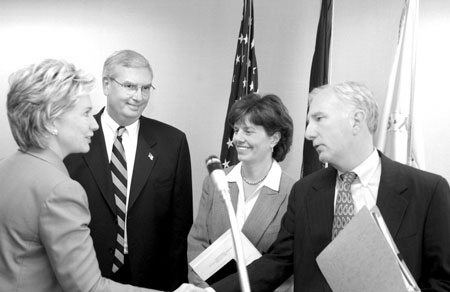By Elizabeth O’Brien
A panel of government and independent experts will review the Environmental Protection Agency’s response to the World Trade Center disaster in an attempt to bolster public confidence in the cleanup process, officials announced on Monday, March 1.
Sen. Hillary Rodham Clinton joined E.P.A. officials and panel members at the Monday news conference, held at the E.P.A. regional offices in Lower Manhattan. Twice during the event Clinton called the panel a “good faith effort” by the E.P.A. to evaluate its work following Sept. 11, 2001 and to suggest improvements if necessary.
Elements of the E.P.A. response to the Twin Towers’ collapse, particularly the agency’s premature declaration one week later that the air Downtown was safe to breathe, prompted public outcry and mistrust of the agency.
“Certainly, it is imperative that we restore trust to our government when it comes to matters of life, death and health,” Clinton said.
The creation of the 17-member panel resulted from negotiations among Clinton, the E.P.A. and the White House Council on Environmental Quality. Last fall, Clinton temporarily blocked the nomination of Michael Leavitt as E.P.A. administrator, demanding that officials revisit the E.P.A. response to the terror attack and the agency’s declaration about Downtown air safety. That conclusion was judged to be premature in a report released last August by the E.P.A.’s independent inspector general.
The panel will oversee the retesting of selected Lower Manhattan apartments that were cleaned, mostly last year, as part of the E.P.A.’s voluntary asbestos testing and cleaning program. Members will also evaluate the E.P.A.’s working assumption that cleaning for asbestos would adequately remove other potentially dangerous toxins such as lead, even if workers did not test for other contaminants in most homes.
Clinton acknowledged the panel’s initial mandate was not all she had hoped for, but that she agreed to certain compromises to ensure there would be a panel at all.
“I would have liked to have seen greater testing in a wider area,” Clinton said on Monday. “The process that led to the creation of the panel was one of intense, ongoing negotiation among my office, the White House and the E.P.A., and this is always a difficult balance to strike. I think that within the administration there were some voices of caution about proceeding to reopen any of these issues, and I am gratified we have gotten to this point.”
Clinton said she hoped the panel would recommend including workplaces in the E.P.A. testing and cleaning. The E.P.A program, announced in May, 2002, focused only on residences and tested and/or cleaned in some 4,200 apartments south of Canal St.
Of that number, 44 apartments, or just over one percent, were found to have asbestos levels that exceeded the E.P.A.’s health-based benchmark. Accurate readings could not be taken in 165 apartments, due to overloaded filters or other complications.
Critics have charged that the Canal St. border was arbitrary because the W.T.C. dust plume traveled beyond there to Brooklyn and other points. The panel will have up to two years to determine the characteristics of the plume and where it was dispersed, and based on its findings may make recommendations for further E.P.A. evaluation.
“We’re happy for the retesting, but we want representative testing,” said Kimberly Flynn, a member of 9/11 Environmental Action, a community group.
Retesting will begin as soon as possible, said Dr. Paul Gilman, assistant administrator for research and development at the E.P.A. and chairperson of the panel. Gilman said he hoped the retesting would be completed by June but acknowledged that goal might be “terribly optimistic.”
E.P.A. officials said on Monday that the agency had learned some lessons from its work following the W.T.C. disaster; in its response to the Inspector General report, the E.P.A. also admitted mistakes were made. But when pressed for details on Monday, Steve Johnson, E.P.A acting deputy administrator, mentioned only the bureaucratic concern that the agency’s response could have been better integrated at times with that of other federal departments. The Department of Homeland Security, created after 9/11, would help streamline multi-agency response in the future, Johnson said.
Catherine McVay Hughes, a member of Community Board 1 who lives just east of the World Trade Center site, was named to the panel as a community liaison. Hughes traveled to Washington last year at Clinton’s invitation to testify about air quality concerns at a Congressional hearing. In her remarks at Monday’s news conference, Clinton thanked Hughes for agreeing to serve on the panel.
“I’m honored to be included—it’s a big responsibility,” Hughes said after the event.
The panel will meet first on March 31, when members will evaluate a retesting proposal; there has been no decision yet on the exact number or locations of the apartments to be retested. To help foster a transparent process, meetings will be held in New York and will be open to the public except when the public interest dictates otherwise, E.P.A. officials said.
Clinton called the panel “a bit of an experiment” in response to an unprecedented event: “We don’t know fully understand exactly what has happened to people in various degrees of exposures over certain lengths of time and different settings.”
Elizabeth@DowntownExpress.com
Reader Services


































